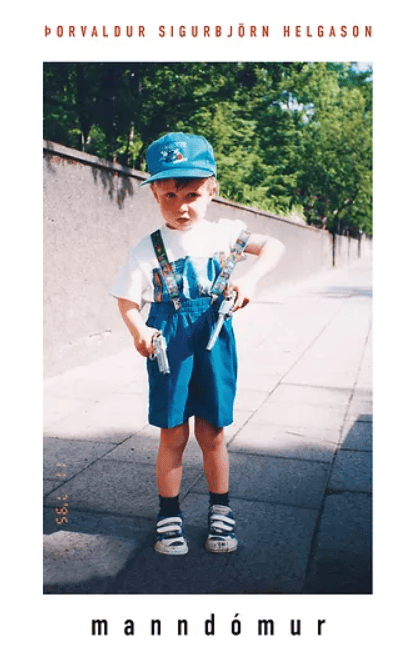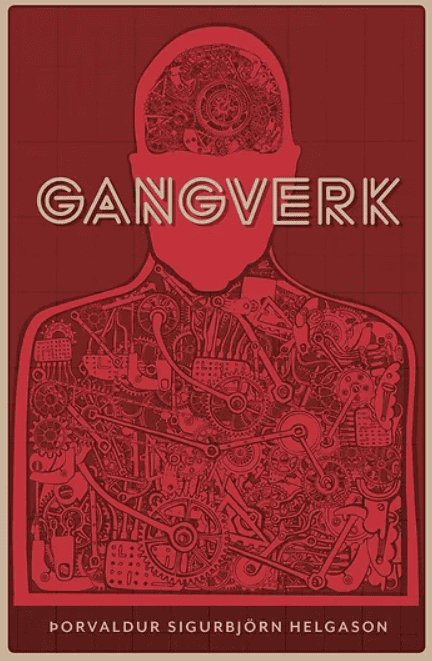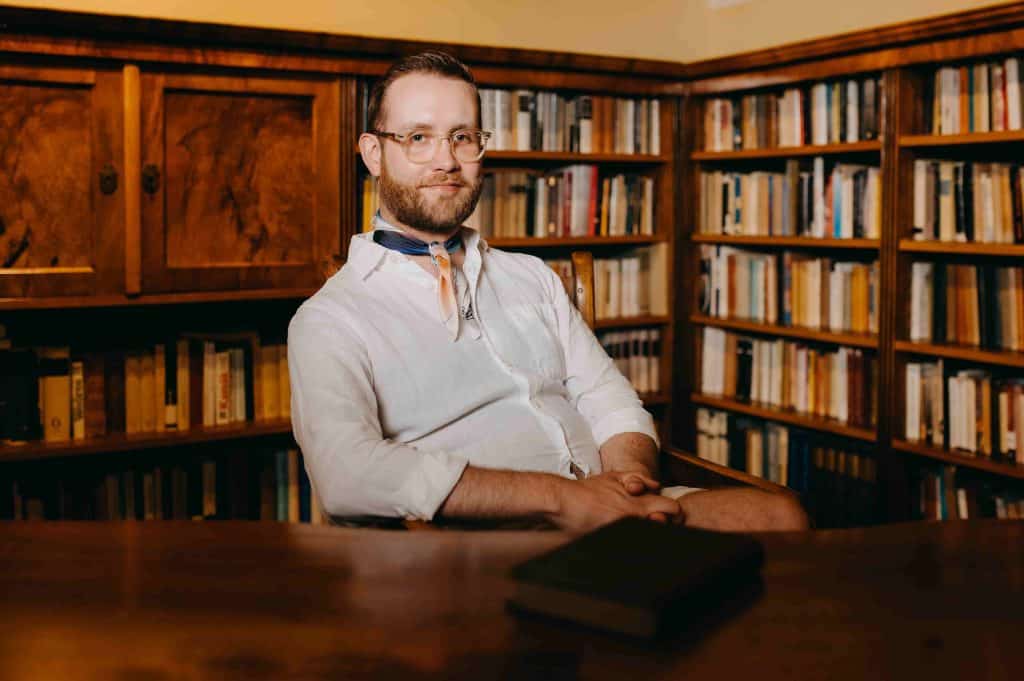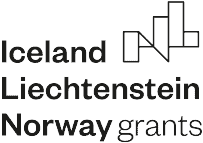“Poetry might not make big headlines, but its lifespan is longer,” Thorvaldur Sigurbjörn Helgason, our resident in June 2023, remarked about his relationship with poetry. On his final day in Košice, our team member, Laura Kristína Priatková, spoke with Thorvaldur about the potential of solitude, Icelandic identity, the local art scene, and his first venture into prose composition.
How did you spend your last day here? What are you saying goodbye to?
I spent my last day here just like every other at the residency. I woke up and went for a coffee. I like starting my day with a good cup of cappuccino and some reading, especially outside, because the weather is beautiful now.
Besides the residency, I am also saying goodbye to this wonderful routine and having the opportunity to wake up at my own pace and start the day softly.
How do you feel about your residence now, as you leave?
Coming here was truly liberating. Košice is a calm, tranquil city with a chill vibe. There is not too much going on, yet the cultural life is simultaneously very vibrant, so one has a good balance here. The apartment is lovely and very well-situated. It is a good place to come and get away from everything. Before the residency, I had no prior knowledge of Košice or Slovakia, so it has been a delightful experience to discover and explore.

Currently, you’re working on your first novel, set in Iceland. How has Košice been able to provide you with stimulation in this context?
Most Icelanders have a kind of love-hate relationship with their country. I often miss Iceland, but at times, it can be quite suffocating there. There are moments when you simply feel the need to escape, especially if you live in Reykjavik.
Moreover, the book I’m writing doesn’t take place in the present but in the future, so I feel free of the need to confine myself too much. I believe it is very beneficial to venture somewhere else, as it adds a new perspective to writing and thinking. Gaining clarity is extremely useful.
Do you draw inspiration from foreign cultures, or do you prefer Icelandic sources?
I think it is not so much a question of inspiration but rather a question of a suitable environment. Perhaps the location would be stimulating if I were writing poetry, but I am working on a novel, so I need more of a space for focus, and somewhere I can sit down and work.
However, in general terms, I certainly draw inspiration from different places, especially from my experiences. When I am somewhere alone, especially in a foreign city, I spend a lot of time in my own head. I don’t interact with many people, I don’t have many obligations, I don’t do as much. It’s a time of contemplation and introspection.
At first glance, it does appear to be a self-contradictory process, but it is not without its significance. There’s a profound sense of solitude and concentration within a crowd, especially when one can’t understand the conversations around oneself… Do you travel to experience an internal journey?
I think you really hit the nail on the head. While it may not always be a conscious choice, I do travel to different places to engage in self-dialogue and reflection.
The solitude within a crowd or in an unfamiliar place is liberating since nobody pays you much attention, allowing you to be whoever you wish.
However, it can also be challenging, as you keenly feel the absence of human connection and the familiarity of daily life, from which you are detached as a visitor.
Writers, to a large extent, are solitary individuals, as solitude is an essential and indispensable component of the writing process. We can either resist it by constantly seeking company and distractions, or we can welcome it, coexist with solitude, and treat it like an uninvited but benign guest.
I recently revisited one of my favourite books, “Letters to a Young Poet” by Rainer Maria Rilke. In several of the letters addressed to the young military cadet, Rilke underscores the significance of solitude for the poet.“Love your solitude and try to sing out with the pain it causes you. For those who are near you are far away… and this shows that the space around you is beginning to grow vast…. be happy about your growth, in which of course you can’t take anyone with you.”
I find this to be a truly beautiful concept that from solitude and loneliness, one can transform into something vast.
In recent times, I’ve delved into a period of introspection and self-reflection. I’ve come to understand and acknowledge aspects of myself and my writing that I’ve been wrestling with for years.
The residency in Košice granted me the opportunity, both in terms of time and environment, to initiate this transformative journey, and for that, I will forever be grateful.

You have studied theatre and performance, followed by creative writing and later jazz music. What is the value of synthesising different artistic forms for you as a multidisciplinary artist? Does a new genre provide you with a similar sense of a new possibility for introspection as travelling to a foreign country?
It doesn’t hold such a profound meaning for me. I’m simply intrigued by many things, and you could say I have a bit of “artistic ADHD” – I can never decide on just one thing. I always need to try everything. Music and literature are two things that have been with me almost my entire life. I started with music as a child, and around the same time, I began writing stories. Since then, I’ve had a relationship with various artistic forms.
Your literary works predominantly take the form of poetry. Will your debut prose emerge from your poetic style ? Or are you aiming to create something completely detached from your poetry?
This is a difficult question. Sometimes, I do enjoy combining things, but right now, I’m writing fiction, so my primary focus is on that. I’m currently not writing much poetry and am not involved in music creation either. Maybe my next project will involve poetry or journalism, and during that period, that will be where I place my primary focus.
And what about theatre?
Well, it’s been quite a while since I’ve been involved in theatre work. After completing my theatre studies, I immediately delved into creative writing, and that sort of took over. However, I’m sure I’ll return to the theatre at some point. I have a few ideas for plays that I’d like to write.
Were you certain about your passion for art before you began studying it?
It was during university that I was able to fully engage in creative work. But I’ve always had dreams related to art, and my first loves in this regard were definitely literature and music.
Speaking of love, do you have a strong emotional attachment to any writer or artist? Someone who continues to fascinate you and influences your work?
Yes, I can name at least two authors who have inspired me greatly. The first is the Polish poet Adam Zagajewski, probably my favourite. I even have a line from one of his poems tattooed on my forearm in Icelandic. It goes like this: “Við skildum fátt í lífinu og þráðum þekkingu”, which means: “We lived understanding little and craving knowledge.”
This poem has been my favourite for at least five years.
Then I’ve been reading one author I discovered while in the residency. I found a book of his in the apartment. He is an American-Vietnamese poet and a novelist, Ocean Vuong. I read his novel –
– On Earth We’re Briefly Gorgeous?
Yes! It caused an explosion in my brain. Incredibly beautiful. I’ve never read a book like this before. I even sent him a letter. Fan-like. I’m not sure if he’ll receive it, but this book truly has done something to me.
Back to your question: I have many friends in Iceland who are also writers, and these friendships guide me and help me immensely. I won’t mention specific names because I want to avoid playing favourites. The Icelandic community is tiny and closely interconnected, so getting to know interesting people there is really easy.

Do you consider yourself an Icelandic writer as opposed to a writer who happens to write in Icelandic?
One can never truly escape their origin. Perhaps only if they move somewhere else and start writing in that local language, but I don’t think so. Language grounds and influences everything. So yes, I consider myself an Icelandic author.
When you think about the Icelandic artistic community, do you perceive any similarities among the authors? Do you believe that the country you were born in can determine your craft, expression, and style?
In Iceland, we are fortunate to have a large literary scene and a strong tradition of literature, so we all benefit from that. But people still do whatever they want, and each finds influences in different things, foreign authors, etc. Probably every Icelandic author gets the clichéd question: “How does Icelandic nature affect you?” Although it can be a formative source for some people, others might be fascinated by Reykjavík’s nightlife, and others might want to write about their family drama, and so on.
Did you have an opportunity to engage with Košice’s art scene?
Not so much. That was the only thing that I missed a bit here. I didn’t get to know many people here, but I got to explore the city. Still, I need to learn more about Slovak culture. I don’t know any Slovak authors besides Dominika Moravčíková and Juliana Sokolová, with whom I interacted through the organisation of my residency. I still need and want to discover more.
This week, I went to the VUNU Gallery. There was a lovely opening (of an exhibition by Hungarian artist Adrián Kiss, editor’s note). And then I also visited a few museums.

Let’s talk about readership. Do you have any expectations regarding what readers should take away from your works?
I’m always simply pleased when someone makes the effort to read my works. When you’re a poet, you can’t expect your poetry collection to become a bestseller. I have published three books of poetry so far, and they’ve all been quite modestly promoted. Therefore, it brings me great joy when even just one person reaches out to me and shares something positive about my book. That’s more than enough.
Yet, the poetry scene in Iceland appears to be very vibrant…
Everyone involved in the literary scene has a great interest in poetry. People enjoy attending poetry readings and discussing books. However, the scene itself is relatively small. Those who buy, for example, crime novels or similar genre books usually don’t reach for poetry.
In this context, the perspective from my journalistic practice seems useful, because as a journalist, you can write an article that the whole country reads. Everyone notices that article, but only for a day. Then, it fades into oblivion. Poetry has the opposite tendency. It might not create big headlines, but it lives longer.


Is that why you write poetry? To leave a lasting impact?
For me, poetry isn’t about the external world, about the acceptance you receive, or about fame. Writing poetry is about you and discovering new things about yourself. And then, of course, it’s about experimenting with language, about a deeper understanding of oneself through language.
Is your poetry based on your life experience or derived purely from your imagination?
That’s an interesting question. I believe that poetry is always a response to one’s life and experience, but at the same time, it has the power to shape how we live. It offers us a poetic perspective through which we can perceive and understand our lives differently. Finding hidden beauty in things as they happen to you. There is always some kind of interplay between the two, I suppose…
You have previously mentioned that the novel you’re currently writing is set in the future. Without giving away the plot, I can say it includes futuristic elements. How do you perceive time in the realm of art?
I’m constantly thinking about time. One of the greatest tragedies of human life is being aware of time and its inescapable nature. I perceive the past as a constant presence even when thinking about my current life and its trajectory. But it’s a beautiful tragedy, experiencing the flow of time in its borderline forms – too fast and very slow or stagnant. Time influences my creativity just as much as my life.
That sounds quite nostalgic. How do you feel about departures and farewells?
I’ve always been incredibly nostalgic and very aware of the preciousness of time. Even though I’ve spent a month here in Košice, and it seems like a significant amount of time, I’m surprised by how quickly it’s gone as I prepare to leave. I take all these experiences with me as I enter into the next phase. The idea of a fresh start motivates me to continue.

~
More information about Thorvaldur S. Helgason can be found at www.thorvaldur.org.
Interview conducted by: Laura Kristína Priatková
Editor: Dominika Moravčíková
Photography: Tibor Czitó, Dominika Moravčíková
The Epic Residencies project received a grant from Iceland, Liechtenstein, and Norway through the EEA Grants in the amount of €150,000 and was co-financed with €22,000 from the state budget of the Slovak Republic. The project’s goal is to build the capacity of partner organizations, promote inclusive education, facilitate intercultural exchange, and engage the public. To learn more about programs and projects funded by the EEA Grants in Slovakia, visit the website www.eeagrants.sk. All projects are co-financed at a rate of 15% from the state budget of the Slovak Republic. Read more information about the project in the published project contract: 1522/2021 | Project Register (gov.sk).






